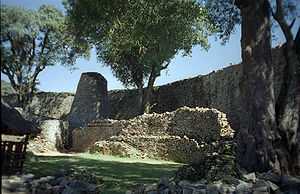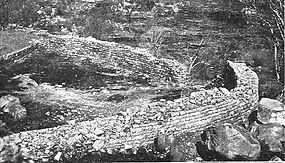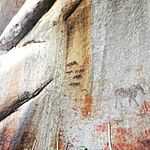National Monuments of Zimbabwe
The National Monuments of Zimbabwe are protected and promoted in accordance with the National Museums and Monuments Act 1972.[1][2] This law replaced the colonial-era Monuments and Relics Act 1936, which in turn replaced the 1902 Ancient Monuments Protection Ordinance and 1912 Bushmen Relics Ordinance.[3] The National Museums and Monuments of Zimbabwe (NMMZ) is the body responsible for maintaining the Archaeological Survey, the national inventory of monuments and sites.[4] In April 2000 there were approximately 14,000 entries on the Archaeological Survey, of which 118 were National Monuments (including natural, cultural, and mixed sites).[4] 79 National Monuments had been declared under the old system by 1954.[3] By 1980, the register had grown to over 3,000 sites and 169 declared monuments.[3]
National Monuments
The National Monuments register includes the following sites:[3]
| Site | Location | Date | Comments | Coordinates | Image |
|---|---|---|---|---|---|
| Great Zimbabwe | Masvingo | 11-15th centuries | UNESCO World Heritage Site | 20°16′23″S 30°56′04″E / 20.273063°S 30.934344°E |  |
| Khami | Bulawayo | 15-17th centuries | UNESCO World Heritage Site | 20°09′30″S 28°22′36″E / 20.15833°S 28.37667°E |  |
| Domboshawa Cave | Domboshawa | Ancient rock art | 17°36′S 31°08′E / 17.600°S 31.133°E |  | |
| Ziwa | Nyanga | 17-18th centuries | UNESCO Tentative List | 18°08′S 32°38′E / 18.133°S 32.633°E | |
| National Heroes Acre | Harare | 1981 | .jpg) | ||
| Mashonaland West Provincial Heroes Acre | Mashonaland West | Site of the Battle of Sinoia | 17°21′25″S 30°16′26″E / 17.357°S 30.274°E | ||
| Matobo Rock Art Sites | Matobo National Park | UNESCO World Heritage Site | 20°33′00″S 28°30′29″E / 20.55000°S 28.50806°E |  | |
| Tsindi | |||||
| Harleigh Farm | |||||
| Diana’s Vow | |||||
| Chamavara | |||||
| Zinjanja | |||||
| Majiri | |||||
| Alter site | |||||
| Kagumbudzi | |||||
| Matendera | |||||
| Jumbo Mine | |||||
| Dambarare | |||||
| Fort Makaha | |||||
| Tohwechipi’s Grave |
See also
References
- ↑ "Legal frameworks for the protection of immovable cultural heritage in Africa". ICCROM. pp. 5, 18–21. Retrieved 8 May 2012.
- ↑ "National Museums and Monuments Act". www.law.co.zw. Retrieved 8 May 2012.
- ↑ 3.0 3.1 3.2 3.3 "Legal frameworks for the protection of immovable cultural heritage in Africa". ICCROM. pp. 42–45. Retrieved 8 May 2012.
- ↑ 4.0 4.1 "Zimbabwe". UNESCO. Retrieved 8 May 2012.